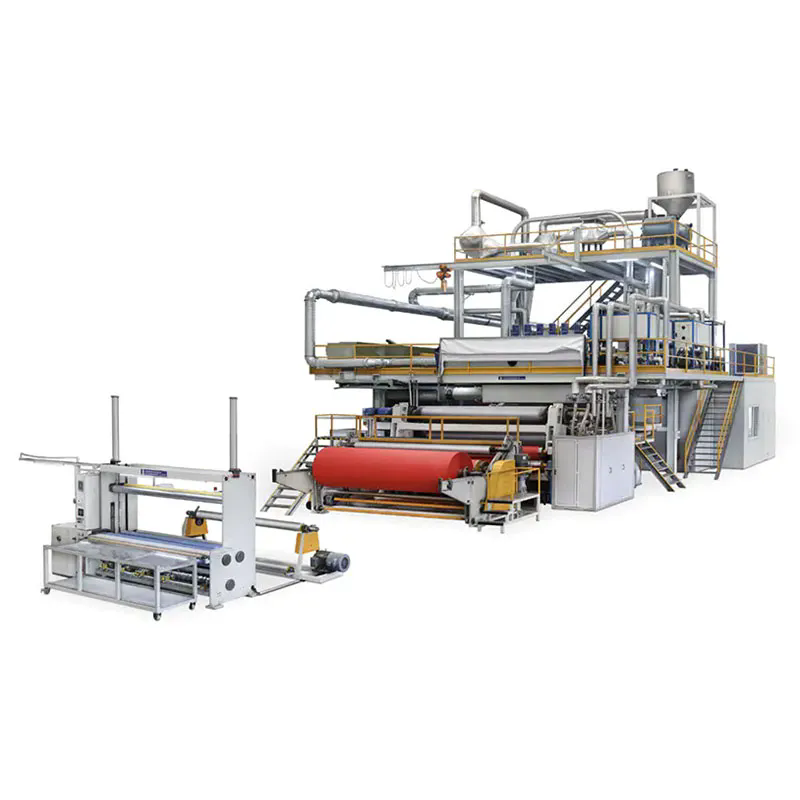Unlocking Efficiency and Innovation with PET Non-Woven Fabric Machines
2024-09-04
In the dynamic world of textile manufacturing, PET Non-Woven Fabric Machines are emerging as a game-changer. These machines are designed to produce high-quality non-woven fabrics from polyethylene terephthalate (PET) fibers, a material renowned for its durability and versatility. This blog explores the features, benefits, and applications of PET non-woven fabric machines, highlighting why they are becoming essential tools in modern manufacturing.
What is a PET Non-Woven Fabric Machine?
A PET Non-Woven Fabric Machine is an advanced piece of equipment used to manufacture non-woven fabrics from PET fibers. Unlike traditional woven or knitted fabrics, non-woven fabrics are created by bonding fibers together through various methods such as mechanical, thermal, or chemical processes. PET non-woven fabrics are valued for their strength, durability, and wide range of applications, making these machines crucial in producing high-performance textiles.
Key Features of PET Non-Woven Fabric Machines
1. Advanced Bonding Technologies
PET non-woven fabric machines use sophisticated bonding technologies to create high-quality fabrics. These technologies include:
- Needle Punching: A process that uses barbed needles to interlock fibers, creating a strong, durable fabric.
- Thermal Bonding: Uses heat and pressure to fuse fibers together, resulting in a smooth, uniform fabric.
- Chemical Bonding: Involves applying adhesives or chemicals to bond fibers, providing flexibility in fabric design and properties.
2. High Production Efficiency
Modern PET non-woven fabric machines are designed for high production efficiency. They can process large volumes of PET fibers quickly, producing a consistent and high-quality fabric in a relatively short amount of time. This efficiency is crucial for meeting the demands of various industries and applications.
3. Precision Control Systems
These machines are equipped with advanced control systems that allow for precise adjustments to fabric properties. Operators can fine-tune parameters such as fabric thickness, density, and texture to meet specific requirements. This level of control ensures that the final product meets the exact specifications needed for different applications.
4. Versatility in Fabric Types
PET non-woven fabric machines can produce a wide variety of fabric types, including different weights, textures, and thicknesses. This versatility makes them suitable for various applications, from medical supplies to automotive components.
5. Eco-Friendly Production
The use of PET, a recyclable material, supports environmentally friendly manufacturing practices. PET non-woven fabric machines can efficiently process recycled PET fibers, reducing waste and promoting sustainability in the textile industry.
6. Automated Operations
Many PET non-woven fabric machines feature automated processes for material handling, fabric formation, and finishing. Automation enhances operational efficiency, reduces labor costs, and ensures consistent product quality.
Benefits of PET Non-Woven Fabric Machines
1. Durability and Strength
Non-woven fabrics produced from PET fibers are known for their durability and strength. PET fibers are resistant to abrasion, tearing, and stretching, making them ideal for applications that require robust and long-lasting materials.
2. Cost-Effective Manufacturing
The high efficiency of PET non-woven fabric machines translates into cost savings in manufacturing. Reduced production time and lower labor costs make PET non-woven fabrics an economical choice for various applications.
3. Wide Range of Applications
PET non-woven fabrics have numerous applications, including:
- Automotive Industry: For interior components such as headliners and door panels.
- Medical Supplies: Including surgical gowns, masks, and wound dressings.
- Filtration Systems: Used in air and water filters for their ability to trap particles and impurities.
- Consumer Products: Such as shopping bags, home textiles, and disposable items.
- Construction: For geotextiles used in soil stabilization and erosion control.
4. Customization and Flexibility
The precise control offered by PET non-woven fabric machines allows for the customization of fabric properties. This flexibility enables manufacturers to produce fabrics with specific characteristics, such as varying levels of softness, stiffness, or absorbency, to suit particular needs.
5. Sustainability
The ability to use recycled PET fibers in the production process supports sustainability efforts. By recycling PET materials, manufacturers can reduce environmental impact and contribute to a more eco-friendly textile industry.
Applications of PET Non-Woven Fabrics
1. Automotive Industry
In the automotive sector, PET non-woven fabrics are used for a variety of interior components, including headliners, door panels, and soundproofing materials. Their strength and lightweight nature make them ideal for enhancing vehicle interiors.
2. Medical and Hygiene Products
PET non-woven fabrics are crucial in the medical industry, where they are used in products such as surgical gowns, face masks, and wound dressings. Their ability to provide protection and comfort is essential in healthcare settings.
3. Filtration
Non-woven fabrics made from PET are employed in filtration systems for air and water. Their efficiency in trapping particles and impurities makes them effective in maintaining clean and safe environments.
4. Consumer Goods
PET non-woven fabrics are found in a range of consumer products, including reusable shopping bags, home textiles, and disposable items. Their versatility and cost-effectiveness make them a popular choice for everyday products.
5. Construction and Geotextiles
In construction, PET non-woven fabrics are used for soil stabilization, erosion control, and other geotextile applications. Their durability and strength contribute to the effectiveness of construction projects.
Conclusion
The PET Non-Woven Fabric Machine represents a significant advancement in textile manufacturing, offering efficiency, versatility, and eco-friendliness. With its ability to produce high-quality non-woven fabrics from PET fibers, this machine plays a crucial role in various industries, from automotive to medical and beyond. As the demand for durable, cost-effective, and sustainable materials continues to grow, PET non-woven fabric machines are poised to remain at the forefront of innovation in the textile industry.



